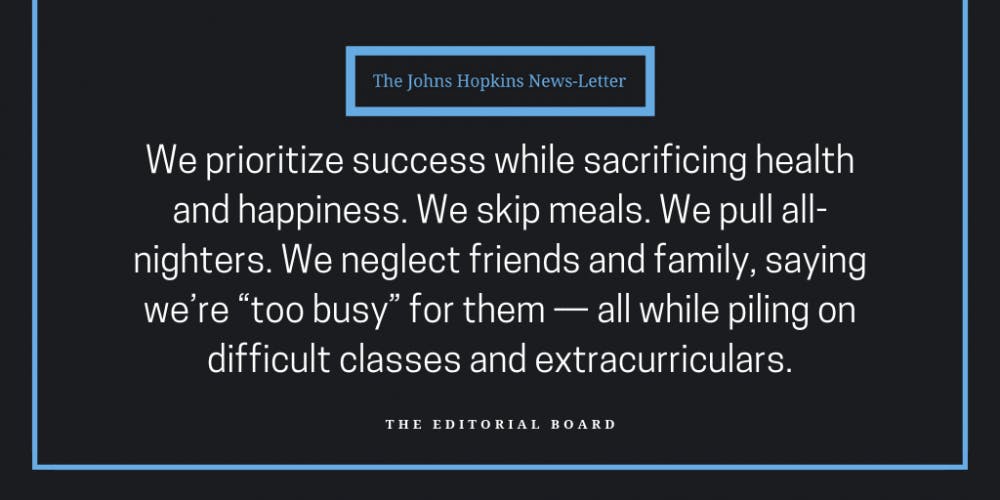Writing about work culture at Hopkins is tricky. We acknowledge that we are extremely privileged to be able to attend college, surrounded by scholars who are the very best in their field and peers who are already accomplishing so much. We are grateful to pursue our higher education in Baltimore, at one of the nation’s top institutions. And yet, as finals approach, and Brody remains full, many of us are burnt out.
Burnout is such a core part of our experience that we often forget to ask how it starts and why it persists. Especially at this time of the year, there’s a dissonance between the joy we’re supposed to find on sunnier days — during Alumni Weekend and Spring Fair and afternoons lying on the Beach — with the constant feeling of being on-edge and tired. We’re exhausted – mentally and physically. And it seems like there is no way out of this cycle of overwork.
We see our peers succeeding – landing competitive summer internships, balancing a multitude of extracurriculars, acing tests – and feel as though we should be too. So we continue to foster a culture that encourages overworking ourselves. What else can we expect? We pushed ourselves hard in high school in order to come to a college like Hopkins. We wanted to be surrounded by other highly-motivated students.
But the payoff has been steep. We prioritize success while sacrificing health and happiness. We skip meals. We pull all-nighters. We neglect friends and family, saying we’re “too busy” for them — all while piling on difficult classes and extracurriculars. According to the Task Force on Mental Health and Wellbeing’s 2018 report, 58 percent of our students who responded to the 2016 Enrolled Student Survey feel overwhelmed “often or very often,” 25.6 percent feel sad “often or very often” and nearly 30 percent of surveyed undergraduates and over 15 percent of graduate students have seriously considered suicide.
Burnout isn’t exclusive to Hopkins. Elite universities are not known for ranking among the happiest colleges in the country, and while poor mental health seems to be a growing trend among American colleges in general, it seems that elite institutions like Hopkins are disproportionately impacted.
We may tell ourselves, it’s just for these four years. We’ll change once we graduate. But the likely reality is that we will not simply unlearn our habits once we leave Homewood Campus. We’ll carry them with us into our new jobs in new cities, and we’ll face the cycle of burnout once again.
So what can we do?
First, we can recognize that we have a problem and start reflecting on how burnout is affecting us. Underneath all of our accolades, are we happy with the people we are becoming? Is self care enough to offset the stress of burnout?
Deep down, we cannot help but realize that self care alone is not the sole solution to our problems. No matter how many dogs we pet, succulents we plant or times we meditate, there’s still a persistent nagging at the back of our minds. Each member of the Editorial Board recalls a time in which they’ve felt guilty for having fun with friends or going out on weekends. We should be working harder. We should be more productive. And so the cycle of overwork and burnout continues.
What Hopkins needs is a cultural shift. Sometimes it feels as though there are not enough hours in the day, but we must try to take advantage of the resources available to us. Hopkins has improved its mental health resources and services significantly since University officials commissioned the Task Force on Mental Health and Wellbeing in 2016. Wait times in the Counseling Center dropped from weeks to minutes. The peer-listening group A Place to Talk now has its own room in the library. Our Recreation Center offers classes for free. Last week, the Student Government Association hosted its first ever Wellness Week to promote mental health. These are all resources that students don’t feel like they have the time to access when they’re juggling so many other commitments.
However, this cultural shift shouldn’t just be up to the students. Many professors have begun highlighting mental health resources in their syllabi, but in what other ways can they help accommodate students who are struggling with their mental health? The best professors cultivate a classroom environment where students understand the importance of deadlines and academic integrity, but also feel like they can talk to their professor if they are struggling with their mental health. More professors need to recognize that mental health is as important as physical health. Granting absences or extensions on assignments when students feel overwhelmed would be a good start.
Mental health problems that result from burnout culture aren’t something we can easily fix. We shouldn’t have to sacrifice sleeping, eating, exercising and our social lives so that we can do moderately well in our classes, our extracurriculars and our jobs. But as this academic year comes to a close, we must ask ourselves: how can we break this vicious cycle? How, as a collective, are we able to do better?





